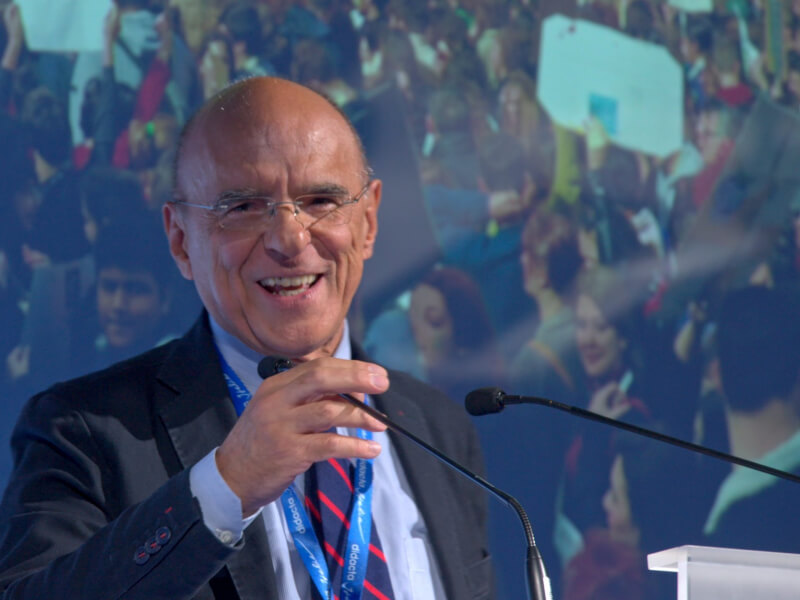31 October 2023 – What inspired you to pursue a career in nature and sustainability?
My fascination with the natural world began in childhood and continued through my secondary school years. I formed a small association called Animal Friends and Scholars Society (in Italian S.A.S.A – Societa’ Amici e Studiosi degli Animali) and printed a mimeographed bulletin with news on zoology and nature. I went on to study at the Institute of Zoology at La Sapienza Rome University, where I was taught by top Italian zoologists. During my studies, I joined WWF Italy as a volunteer in the youth service of the association in 1970. I was hired as a staff member in 1976. During this time, I authored several books on birds and nature that were translated into multiple languages (English, French, Swedish and others). When I read, The Limits to Growth I also started to study sustainability and in recent years I published several books on sustainability. I had the great fortune to know Aurelio Peccei the founder of The Club of Rome, and to see him regularly until his death in 1984. The friendship that developed between us was, for me, truly unique. Aurelio’s thoughts, vision and action were, and are, of great importance to me, of a value that it is really difficult to put into words and that has accompanied me all these years.
How do you think the sustainability conversation has evolved over the last 50 years?
The publication of The Limits to Growth in 1972 and other works during that time sparked my interest in sustainability. It was a time of eco-development and the first “Earth Day” in 1970. The UN Conference on Human Environment in Stockholm in 1972 and the publication of the book “Only One Earth” by Barbara Ward and René Dubos marked the start of sustainability discussion at international level.
In recent decades there has been an incredible advancement in scientific knowledge of the human – earth relations, but modest concrete results in policies. Now a real cultural revolution is needed to transform our growth economy model into a wellbeing sustainability economy model. Today, the evidence shows that the dominant economic model is causing significant harm to our planet, and we’ve reached a critical point in our efforts to maintain a dynamic equilibrium between humans and nature. The global economy is growing beyond the limits of biophysical and ethic social boundaries, and this could irreversibly destabilise the Earth system. In terms of addressing these issues, progress is slow. We need leaders and countries to take on the challenge of sustainability with a new cultural revolution that prioritises wellbeing overgrowth. At present, Pope Francis, a religious leader, is one of the only global leaders actively championing sustainability.
How did you become involved in The Club of Rome?
I became aware of the activities of The Club of Rome during the 1970s thanks first of all to my friendship with Aurelio Peccei and participated in several initiatives on future studies, complexity, and systems thinking. I have been a good friend of several other Italian members of The Club of Rome, including Adriano Buzzati Traverso, Umberto Colombo, and Eleonora Barbieri Masini. Through my work at WWF, I have had opportunities to collaborate with The Club of Rome and its various reports. I am a Secretary General of the Italian Chapter of The Club of Rome, the Aurelio Peccei Foundation, which organises annual lectures on sustainability issues. I became a full member of The Club of Rome in 2018, and I have been active in organising various activities and related events in Italy.
How do you connect The Club of Rome’s global work with the local activities of the Aurelio Peccei Foundation?
The Aurelio Peccei Foundation was formed in 1986 by Aurelio’s family with the money of the United Nations Sasakawa environmental prize, which Aurelio won posthumously in 1984. As a member of the administrative council and then later the foundation’s secretary-general, I have been involved in organising initiatives, such as the Aurelio Peccei Annual Lecture, conferences, and scholarships. We are working to develop a community of Italian Club of Rome friends to coordinate several activities related to The Club of Rome.
How have you been promoting the work of The Club of Rome in Italy?
I utilise my contacts in the academic, media and NGO world to organise events dedicated to The Club of Rome reports and issues. Having edited a number of Reports to The Club of Rome, earlier this year, I edited the Italian version of Earth for All: A Survival Guide for Humanity. This book offers a breakthrough vision on how to ensure wellbeing for humankind within biophysical and ethic social limits. I read the book before its publication and convinced the publisher to print the Italian edition immediately after the English edition. We also organised several initiatives in Italy to spread the book’s messages. The Italian national newspaper “La Repubblica” named their 2023 Green & Blue festival “Earth for All,” and we have worked with various NGOs and universities to use the book as a point of reference for their activities.
Looking ahead, what gives you hope, and what concerns you about addressing these challenges?
Though I am concerned about the future of humanity on our planet, I am hopeful about the significant efforts and progress being made at international levels through initiatives like Agenda 2030. I am hopeful about the new generation’s awareness and enthusiasm for sustainability issues. One worry I have is about the lack of political will to address these challenges, particularly during this short-term political culture. We must work together to create a real cultural revolution that prioritises sustainability and wellbeing. We need a strong movement of movements for changing our economic dominant model. The Club of Rome can be a key player in this process.





